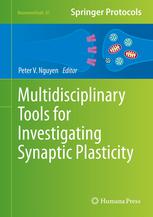

Most ebook files are in PDF format, so you can easily read them using various software such as Foxit Reader or directly on the Google Chrome browser.
Some ebook files are released by publishers in other formats such as .awz, .mobi, .epub, .fb2, etc. You may need to install specific software to read these formats on mobile/PC, such as Calibre.
Please read the tutorial at this link: https://ebookbell.com/faq
We offer FREE conversion to the popular formats you request; however, this may take some time. Therefore, right after payment, please email us, and we will try to provide the service as quickly as possible.
For some exceptional file formats or broken links (if any), please refrain from opening any disputes. Instead, email us first, and we will try to assist within a maximum of 6 hours.
EbookBell Team

4.3
8 reviewsInvestigations involving incisive mechanistic dissection of various types of synaptic plasticity have revealed that it plays key roles in neural development, sensory information processing, cortical remapping following brain injury, perception, and behavioral learning and memory. Disruptions of synaptic plasticity may underlie neurological and behavioral disorders such as Alzheimer disease, Fragile-X syndrome, autism, and drug addiction. Multidisciplinary Tools for Investigating Synaptic Plasticity, therefore, assembles expert contributions that highlight techniques and strategies used in probing the cellular and molecular mechanisms of synaptic plasticity in the nervous systems of vertebrate and invertebrate species. Divided into three sections, this meticulous volume describes biochemical and genetic strategies for studying synaptic plasticity, behavior, neural development, and synaptogenesis, and also includes cellular electrophysiological and optical methods for interrogating a diverse array of mechanistic issues. As part of the Neuromethods series, this book contains the kind of detail and key implementation advice that maximizes successful results.
Authoritative and invaluable, Multidisciplinary Tools for Investigating Synaptic Plasticity serves as an ideal primer for introducing researchers to specific techniques that will enhance their success at addressing novel questions in synaptic plasticity at the lab bench.